SPECIAL REPORT… Erosion takes lives, properties of communities as funds to curtail it remain unaccounted for
With over 2,800 active erosion sites in Nigeria’s Southeast Region, the risk of people losing their homes and means of livelihoods loom larger than ever before, even as funds to tackle the menace seem to have been diverted.
Gideon Arinze was In Nsukka, and captured the misery and pain staring victims in the face.
The menacing showers
Each time the clouds begin to gather, farmers in sub-Saharan Africa naturally fall into spates of happiness, but for the residents of some communities in Nsukka Local Government Area of Enugu and other states in the South Eastern Region, it is a clear sign that they need to get prepared for the unknown.
It was a blistering Tuesday afternoon, and the clouds had started gathering strength before this reporter left the house of 60 years old Leonard Ngwu. Soon, the rain started and on a return to Ngwu’s house after the cry of nature, the once dry environment had become damp, difficult to walk on and potentially wrecking.
By the time the rains stopped, Ngwu who is a teacher had been subjected to turmoil, standing by one corner of his house with his hands wrapped around his chest and his eyes wide open. Anger clearly written all over his face.
At one end of the house, members of his family were removing water and other debris out of their rooms. His compound had just been submerged again. The flood went away with some of his property as usual.
“This erosion has dealt with us,” he said pointing towards the direction by which the erosion channel passes through his house. “This is not the first time we are experiencing this situation. It has caused a lot of damages to me and my family. We have lost many of our property. We don’t even know how to recover them again,” he said visibly trying to stifle his anger.
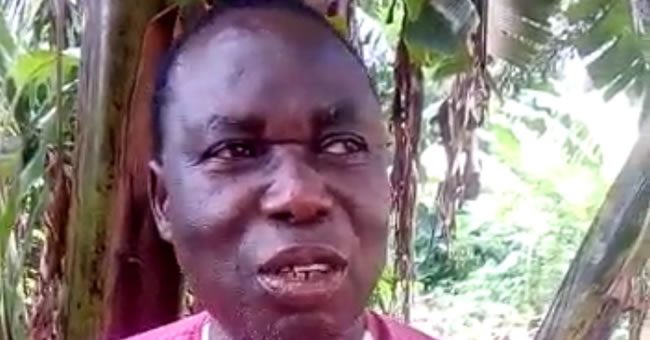
Ngwu: My personal efforts have not worked
Over the years, Ngwu had devised a means, or what seems like a means, of mitigating the erosion by building a wall around his house. But this does not often work. The situation is even more terrible now as he and his family are almost forced out of their home.
NEWMAP to the rescue?
Ngwu is a member of a 10-man committee that has been selected by the Nigerian Erosion and Watershed Management Project (NEWMAP) to look into the issue of erosion which till now, has become a major source of concern for the people of Onuiyi, a Community that sits sedately in Nsukka Local government of Enugu in South Eastern Nigeria and other surrounding communities.
A World Bank assisted project aimed at addressing the Nigerian gully erosion crisis in Southeastern Nigeria and land degradation in Northern Nigeria on a multi-dimensional scale, NEWMAP is supported by the International Development Association (IDA), the Global Environment Facility (GEF) Trust Fund and the Special Climate Change Fund (SCCF). The project was borne out of the request for assistance made by President Goodluck Jonathan to the World Bank in 2010.
“We have lost about 34 people” Ngwu speaks of the erosion which has existed in Nsukka for over 35 years. “Every year, it causes destruction at least four to five times before the dry season sets in and this usually happens between the months of June and September. Sometimes, we even wish there is no rain,” he said with all manner of seriousness.
‘These monstrous gullies can eliminate whole communities’
Erosion which usually starts off with the relatively uniform removal of the soil surface by excess runoff aided by steep sloping topography, soil/rock types, removal of vegetative cover and poorly designed construction works, becomes concentrated with time, forming channels and rills and if not properly checked, progresses into the monstrous gullies which are found scattered all over the south eastern region of Nigeria.
Across the globe, the number of reported weather-related natural disasters has more than tripled since the 1960s. Every year, these disasters result in over 60,000 deaths, mainly in developing countries.
A report by the International Panel on Climate Change (IPCC), reveals that Africans especially Sub-Sahara Africans, are more vulnerable to climate change effects- among which is erosion- and unfortunately they have the least capability of adapting to its deleterious effects.
Prof. Francisca Okeke, the Director, African Climate Change Adaptation Initiative at the University of Nigeria, Nsukka said that the most prominent and dominant erosion category in the South East region is the gully erosion as the geology of the region has a lot to do with the propagation of gullies.
Among the effects of erosion in the region, she listed: Farmland destruction, vegetation loss, disease outbreaks that affect humans, loss of property and effect on life.
“If we refuse to address this crucial issue overtime, roads would be totally inaccessible, there will be no social, environment and economic balance. There would also be loss of facilities and infrastructure for research, hence, non conducive atmosphere for learning, teaching and research would not work in the nation” she said.
It also takes lives
So far this year, three people have lost their lives to the erosion, following heavy downpour between July and August. The first victims were a motorcycle rider and a student whose bodies were discovered in Alor Uno community, about one kilometer from Onuiyi. The second victim was a little girl who was carried away as she tried to cross a water channel on her way back from school.
The death of the three victims threw the entire community into pangs of fear, not because it is the first time the erosion is washing away lives but because they feared who the next victim would be.
Each time it rains, especially at night, Ngwu, like every other villager, does not sleep a wink. He usually stays awake to keep watch and know when the rain will overflow, leaving the erosion channel and finding its way into people’s homes.
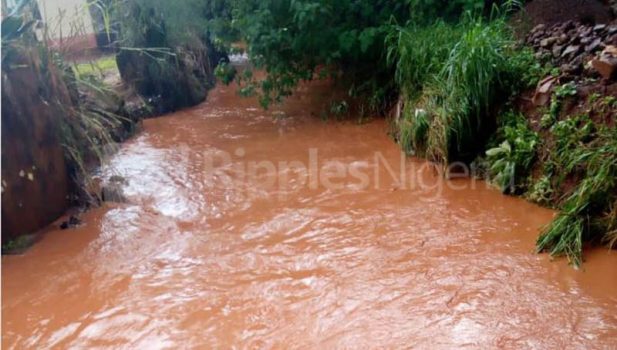
One of the erosion channels in Onuiyi
“For me, that is a way of making sure that the rain does not swallow me and my family when it comes. As soon as I hear the sound, I quickly carry my wife and children away,” he said.
Mr Ngwu and his family are part of over a hundred households whose livelihoods are constantly being affected by the menace of erosion in Nsukka and the South Eastern region of the country.
Houses have been washed away by erosion
Seated in front of his house nestled somewhere at the backwoods of the picturesque Alor Uno rolling hills is 76 years old Simeon Omeje who Intermittently looks in the direction where the house he had built for his children now lies in ruins.
“My son,” he says as he tries to recall when the house was destroyed. “It happened on a Tuesday in July. Myself and my wife had gone into our own room after a busy day when the clouds started gathering strength by 8 p.m.”
Omeje who now shares a single room with his wife and children was fast asleep when the rain began. At exactly 12 midnight when the rain had become intense, he heard a reverberating sound and when he came out to see what was happening, he discovered that the house he had built for his children had been raised down by the rain which had completely submerged his compound.
“At first, I did not know what to do. But when I saw that the rain was gradually finding its way into our own room, I quickly rushed in and took my wife and our little daughter out and carried them to a place where they slept till the next morning,” he said.
By the time Omeje came back in the morning, his room had also been filled with water. His property- chairs, motorcycle, food items and other valuables had all been damaged. Not even his livestock which he reared at one end of his house was spared.
He recalled that sometime in 2016, a part of his house was also lost to the erosion. “I was still trying to see if I can put that one together when this one was destroyed. Now, I don’t even know where to start rebuilding the house again.” he said.
Omeje who said that his older children had all travelled when the rain came that night explained the why the erosion continues to ravage his community.
‘How it finds it’s way to our houses’
He said that the drainage through which rain passes each time it comes is too small compared to the amount of rainfall. As a result, each time it gets to that point, it does not move further anymore. Often times when it overflows, it starts finding its way into people’s houses.
“We are the worst hit because we live very close to where the bridge is located. Many people who were living here have all relocated due to disturbance by the erosion,” he lamented.
Eight people- Just one room.
For 35 year old Sunday Uguoke who is only struggling to survive, life has literally lost its grandeur. He does not know where to begin as he has almost lost every of his belonging to the erosion that is ravaging his community. At one end of his house, Ugwuoke, like Omeje formally reared livestock which he always sold to provide food for his family and take care of other needs. But now, all of them are gone.
Ugwuoke and his family are not staying in their house anymore, as the rainwater, each time it overflows, finds its way into their house. He is married and has 6 children. But they all share a single room in another house he secured in his community.
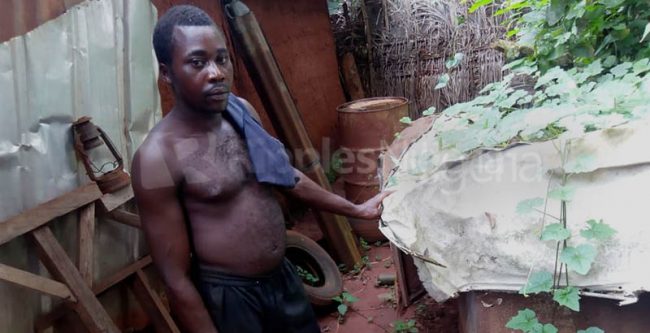
Ugwuoke beside the structure where he reared chickens before they were washed away by erosion
On this day, Ugwuoke had just returned from working on one of the water channels to prevent more erosion. He explains his situation with his face forlorn while his shirt hung around his neck “I am tired of everything. I have been trying to see what I can do so I and my family can at least return to our house because we are not comfortable in the one room we are staying now.
“As you can see, he said pointing in one direction, “my wife is bringing out things that the rain packed into our room the last time it came. We are back and trying to fix things again. Maybe before we finish, it will rain again and destroy everything we have repaired” he said.
Because of the menace of the erosion in Alor Uno, Ugwuoke’s brothers have all left the community with their families. But he does not have money to go anywhere. So, he and his family are forced to remain and suffer the menace of the erosion.
No help from the government
When asked what the government has done in address the problem of erosion in his community, Omeje said that there have been successive governments in the state, but regretted that none has tried to address the issue which has always had devastating effects on the community.
“The government has always come here to make promises each time they hear that the erosion caused destruction. They have talked about it on radio and written about it on newspapers. Each time they come around, we become happy that our problems are over. But as soon as they leave, we don’t hear from them anymore” he said.
He recalled that operatives from the Local Government paid him a visit when they heard that the erosion destroyed houses in the community and made promises thereafter. “But after then, no one heard from them again,” he stated.
He also remembered that operatives from World Bank came last year and even two years ago and surveyed the erosion site, taking pictures and measurements in the process to reassure the community of their readiness to deal with the issue. Yet still, nothing has been done.
“Now, we are completely helpless. We don’t have anywhere to go to. The erosion is almost forcing us out of our home. We have lost almost everything and the government has refused to help us out”
Confirming the words of Omeje, Ngwu said the problem of erosion has existed in the community for a long time and that they had written past authorities several times, yet no positive result was recorded.
Our home now make shift kitchen
Chinwe Eze believes that her community is suffering the menace caused by erosion because those who claim to represent them in government are only after their personal gains.
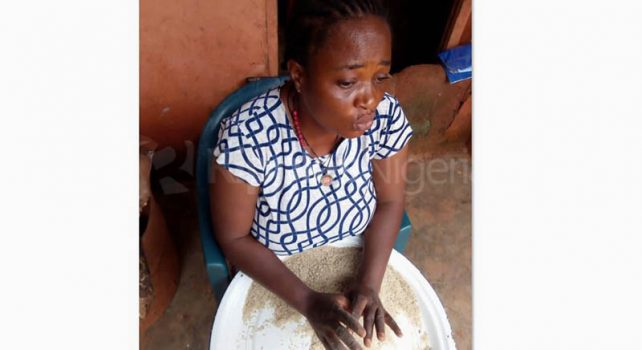
Chinwe explaining the menace of erosion in her community
Eze and her family are presently finding refuge in a nearby house following the heavy downpour that entered their home in August and rendered most of their property useless. That was not the first time the rain is entering their house. But it was the last straw that broke the camel’s back. They could not bear to stay any longer.
When this reporter got to Eze, she was sitting on a chair just in front of the house with her frustration showing on her face. She had only come around to prepare what her family would eat for the day.
In front of the house that had now become uninhabitable, Eze and her family usually set a small fire where they prepare meal each day. “That is the only thing we come here to do now as everything has been destroyed” she said pointing in the direction where a portion of their house now lie in rubble
When asked what the community is doing to help remedy the situation, she said that nobody has done anything yet. “Nobody cares. They are all minding their business since it does not affect everybody in the community”. she said.
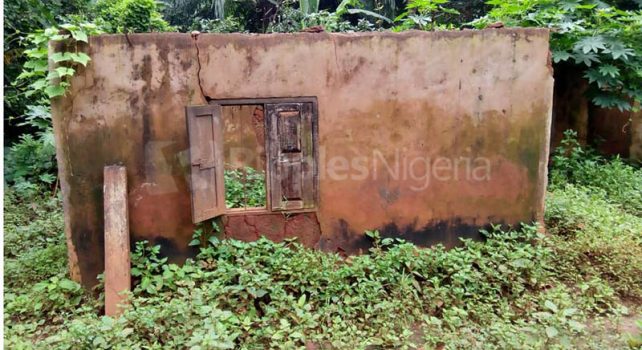
The remains of Chinwe’s house, after it was destroyed by erosion
Constituency development Fund: A tale of corruption and misuse
The neglect of the erosion site in Nsukka and others spread across the South Eastern region, like many other constituency development projects has become .a recurring decimal in this part of the world.
Across the South East, from Enugu to Anambra, Ebonyi, Imo and Abia states, erosion has led to the loss of many lives, cut up and washed away roads, destroyed farmlands, pulled down houses and sent residents fleeing their homes.
First introduced during the administration of former President Olusegun Obasanjo in 1999 after the leadership of the National Assembly approached the executive for approval claiming it was in response to frequent demands of their constituents for the dividends of democracy, constituency development fund, otherwise known as zonal intervention fund, has been widely criticized as a drain pipe employed to perpetrate fraud in the budgeting process and secretly channel public funds into the pockets of Federal legislators.
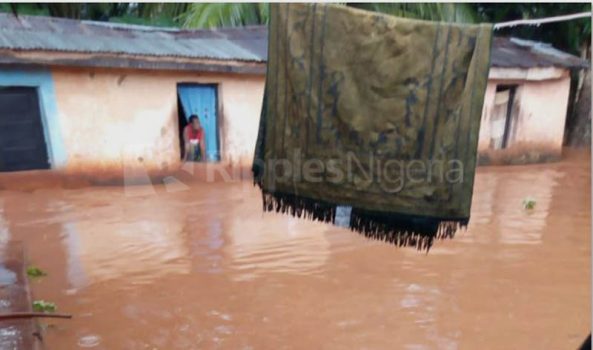
Ngwu’s house when submerged by heavy rainfall after the water overflowed
Specific details on the projects such as cost and target sector are usually kept secret because the lawmakers allegedly engage in self-enriching deals in the implementation of the projects. As a result, constituents hardly know what should statutorily accrue to them.
Though implementing the zonal intervention projects does not involve cash payments or any other form of payment to legislators, as their duty is simply to identify the location and the type of project to be sited; only contractors nominated by the lawmakers are often awarded the contracts. As a result, they still have a say on what happens to the project.
This year, the Senator representing Enugu North Senatorial District at the National Assembly, Utazi Godfrey Chukwuka, nominated a total of N460 Million as constituency development project, out of which N36 million was set aside for erosion control at Onuiyi Nsukka/ Adani Road, Enugu North Senatorial district.
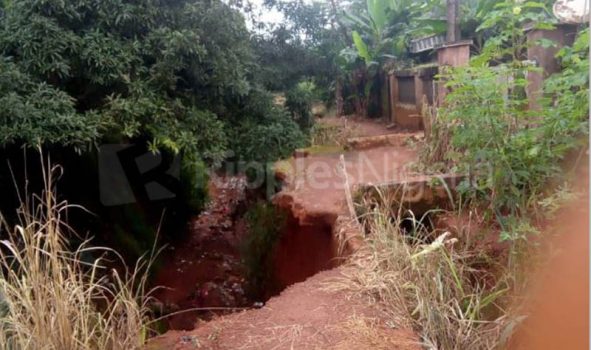
An erosion site
Sadly, a physical inspection of the erosion sites by this reporter shows that no work has been done yet. The sites have remained the way they used to be and the erosion continues to have devastating effect on different communities.
Whereabouts of funds allocated unknown, senator shuns enquiries
Several efforts made by this reporter to contact the Senator to explain how the fund for erosion control in the affected communities have been used did not yield any result as he was neither picking calls nor responding to text messages sent to him.
In September, the West Africa Reporter (WAR) reported how the lawmaker also failed to account for the sum of N104 million he nominated for constituency development project in 2017.
A senior official with Tracka, a non- governmental organization that works to ensure quality delivery of government projects across Nigeria said that the organization has written the lawmaker in the last two months, using the Freedom of Information (FOI) Act asking for explanations on the project he nominated last year. Yet, he has not responded
In 2017, The Federal government approved the sum of N5.567 billion for the 3rd quarter erosion control Accelerated Intervention in six states of the federation, including Enugu, Kano, Bayelsa, Sokoto, Ondo and Osun. But ever since, nothing has changed.
Hope for better days
Over the years, successive governments in Enugu and other states in the South Eastern region have only paid lip service to the menace of erosion. But Ngwu hopes for better days ahead. He believes that the present government in Enugu State will take bold steps to address the situation, as it is so far the only government that has truly realized the extent of damage erosion is causing in rural communities.
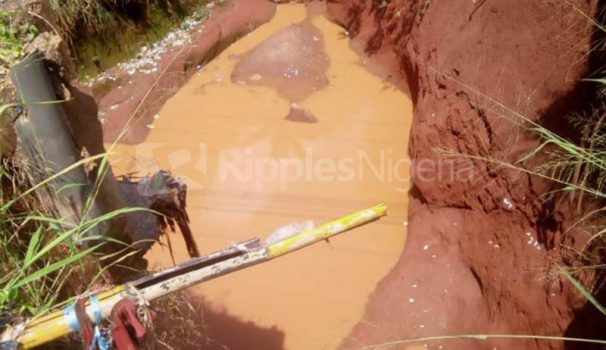
One of the many erosion sites littering the south east region
In August, the state governor made available the sum of N500 million to demonstrate its political will to qualify for the additional financial programme of the World Bank and also approved the Anyaurum Ohom Orba, Onuiyi Nsukka and Enugu Ngow gull erosion sites as priority of his administration.
Ngwu called on the state government to speed up measures to deal with the menace of erosion in the communities affected so residents can heave a deep sigh of relief.
Eze and her family are afraid of returning home. She believes that if nothing is done to deal with the threats posed by erosion in her community, the government may wake up one morning to discover that everybody has been swept away.



